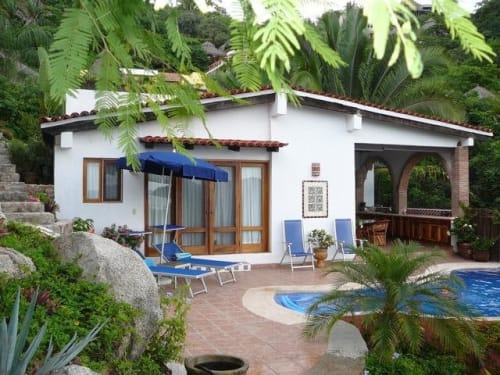SayulitaLife.com members can easily save favorites for vacation rentals, local businesses, real estate and more.
Sign In Create free accountList Your Property
Carolyn and Fernando Lazaro Making a Positive Change in Sayulita
 Carolyn Lazaro was born in Virginia, raised in San Diego, California, and has now spent half her life living in Mexico. She and her husband, Fernando, have been coming to Sayulita since 1990, and now call it home the majority of the year, while the rest of the year they live in San Luis Potosí. Two years ago, Carolyn and Fernando started the Sweet Dreams (Dulces Suenos) project here in Sayulita. Carolyn tells El Sayulero more about this project that creates ecologically friendly mattresses for indigenous Mexican children, mainly from Chiapas, who have nowhere to sleep, but the floor.
Carolyn Lazaro was born in Virginia, raised in San Diego, California, and has now spent half her life living in Mexico. She and her husband, Fernando, have been coming to Sayulita since 1990, and now call it home the majority of the year, while the rest of the year they live in San Luis Potosí. Two years ago, Carolyn and Fernando started the Sweet Dreams (Dulces Suenos) project here in Sayulita. Carolyn tells El Sayulero more about this project that creates ecologically friendly mattresses for indigenous Mexican children, mainly from Chiapas, who have nowhere to sleep, but the floor.
How did you get involved with Sweet Dreams?
My sister told me years ago that people were making mattresses out of plastic bags in San Miguel de Allende. At the time, I couldn’t fathom them being comfortable. But, two years ago, Fernando and I went there to learn how to make them, and then brought the project here, to Sayulita.
What was it that made you want to bring the project to Sayulita?
I consider myself a follower of Christ – love God, love your neighbor, and here our neighbors are the indigenous people. One of the wonderful things about Sayulita is the diversity of culture and the indigenous bring a beautiful color, and while many of us appreciate the colorfulness, we often don’t think about their personal lives. This project is a way for us to show love and compassion to our neighbors and learn more about the needs of others. I have three children of my own and to think about having to put my baby on the floor…
Does the project in San Miguel have the same name? Why the name Sweet Dreams?
No, we just named it Sweet Dreams – because I’m thinking of the kids getting a good night sleep on a mattress, rather than the floor.
What role do you currently play in Sweet Dreams?
 Along with my husband, Fernando, I coordinate it. But, it’s something that there’s no way two people can do alone. Many volunteers have invested their time to make mattresses and their time is taken seriously. We need many hands to do it. It’s a labor of love.
Along with my husband, Fernando, I coordinate it. But, it’s something that there’s no way two people can do alone. Many volunteers have invested their time to make mattresses and their time is taken seriously. We need many hands to do it. It’s a labor of love.
How does Sweet Dreams make a difference in Sayulita?
Well, if you do the math, approximately 1,500 to 1,700 plastic bags go into each mattress. We’ve made 11 mattresses now, so that’s approximately 16,000 plastic bags that have been recycled and are in use, rather than being in the dump, the river, ocean, or in the streets. And then there are the children who are now sleeping on a mattress. We gave a mattress to a family who had a little girl who was about one and a half or two and the father said, “My daughter has never slept on a mattress.”
Will you tell me more about these mattresses?
Volunteer seamstresses sew fabric together to create the cloth mattress covers and then each one is stuffed with rolled plastic bags. The finished mattresses are lightweight, sleep one to two children, and can hang on the wall with their fabric handles, when they’re not in use. This allows the family more room, since each of the families we’ve given mattresses to live in one-room apartments.
Will you tell me about the families you’ve given mattresses to?
Ten of the families work in Sayulita, selling the colorful stuffed animals and braded bracelets and purses, but bus to and from Bucerias each day. They all live in the same neighborhood, but far from the ocean. The other family lives in San Ignacio. All of the families have between two and five children, and all of them live in one-room apartments. My husband and I have gone to visit the families because we wanted to make sure the mattresses were going to people who really needed them. Each of the families we’ve given one mattress, with the exception of one family who we did give a second. The mother had just had another baby and also had a toddler, and I asked her if they were using the mattress. She said no, because her 6-year-old son was now staying in Chiapas with his grandparents to attend school and had asked if  he could please take the mattress. So, a second mattress was given to the family, which was made by children from Costa Verde International School.
he could please take the mattress. So, a second mattress was given to the family, which was made by children from Costa Verde International School.
So, Costa Verde is involved in the Sweet Dreams project also?
Yes, this year we’ve expanded the project and the 4th grade class was taught to roll the bags to stuff the mattresses. (Each classroom at Costa Verde has a project to help the community that is also ecological). The children will meet the family, including the children that will sleep on the mattress, so the project is real to them.
What motivates you to continue to try to make a positive impact in Sayulita?
I think God has put a love of people, and compassion for others, in my heart, and in my husband’s heart. Also, we live in such a beautiful place. Everywhere I look I see beauty- the ocean, trees, people – and I think, “Wow, I am so blessed to live in a place like this. What can I do to help keep it this way?”
What changes do you want to see brought about by Sweet Dreams?
I’d like to see a heightened level of consciousness and love of others, as well as keeping Sayulita clean of plastic bags.
What have you gained from your involvement?
It has been very enriching to see this project come together and to meet people I wouldn’t have met. From the volunteers rolling the bags to the volunteer seamstresses who sew the fabric together to the families that receive the mattresses to the people who have written to ask about bringing bags to Sayulita. A yoga teacher from Bucerias had a retreat of 12 people that came from Canada and each of them brought  an empty suitcase full of plastic bags – there was enough to fill a mattress.
an empty suitcase full of plastic bags – there was enough to fill a mattress.
I’ve also learned there are a whole lot of biodegradable bags in Mexico. Back in the 90’s, Mexico City was one of the first large cities for legislation to use the biodegradable bags – they’ve had them a long time. I have a new understanding for plastic. We can’t use biodegradable bags for the mattresses, so we save them for picking up dog waste and to use for collecting trash. We gladly swap them out to people who bring us plastic bags, but would like the other bags.
What positive changes have you seen brought about by your efforts? What are you most proud of?
Babies not sleeping on the floor. It’s like giving a person a more dignified life – we’re showing that we see the value of the children. They shouldn’t be on the floor. They deserve to be on something soft.
What additional changes would you like to see in the future and what are you doing to make this happen?
Next season we hope to have people rolling bags in one location, as well as in a classroom in Costa Verde. Hopefully we will have two centers working at the same time. Also, we hope to have more people participate in collecting bags and rolling the bags. We´d love for other towns in the area to pick up this project and would be glad to show anyone interested how to do this. It is easy, but like most things worth doing, just takes some time.
How can others help?
One of best ways to support the indigenous families in Sayulita is to buy what they sell. Buy the beautiful and whimsical, stuffed animals, purses or the intricate beaded bracelets. I’ve talked to some of the families and I’m told, “Well we sold only one stuffed animal today – we’re down 40 pesos for the day.” Since they take the bus to Sayulita and back home, there are some days where they don’t even break even.
People can also drop off CLEAN plastic bags at Libreria Sayulita, CVIS and at Friday’s Mercado del Pueblo at the CVIS table. We need seamstresses to sew, and people to donate money for fabric (it costs approximately 150 pesos for fabric for each mattress). For next season, we also need volunteers to roll and stuff the mattresses, which I like to refer to as “rock and roll.” If you’d like to make a donation, you can do so at Libreria Sayulita and let them know it’s for the Sweet Dreams project.
For questions or additional information, you contact Carolyn at carolynleeme@yahoo.com.






